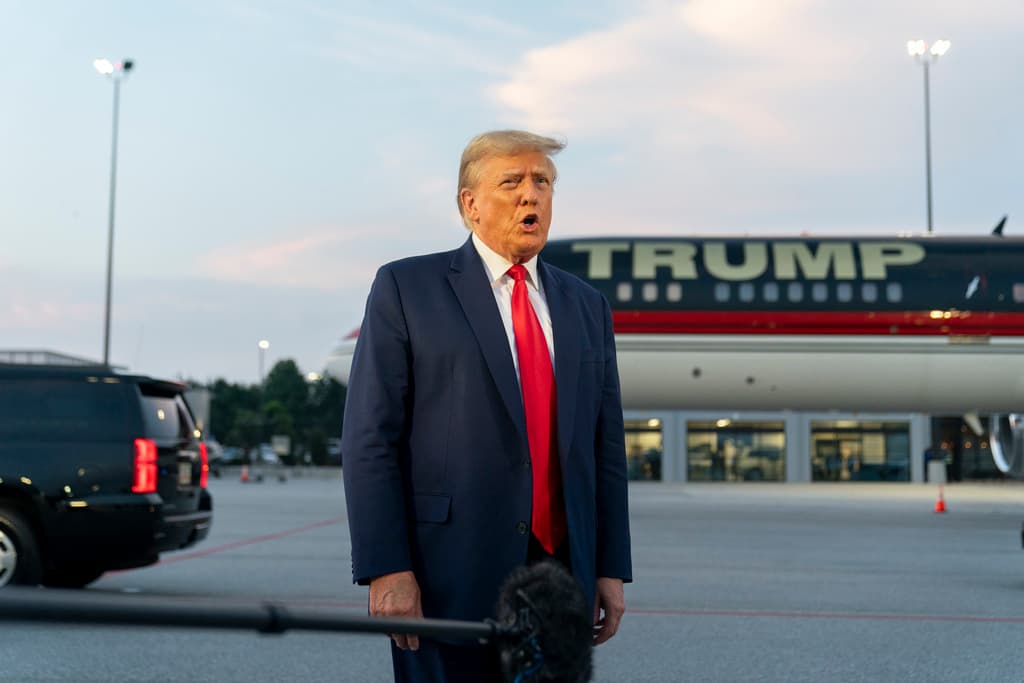As Trump Resists Gag Order, Jack Smith and Judge Chutkan Could Offer a Template for How To Mute a President
It appears as if judges, plaintiffs, and prosecutors are all watching the special counsel’s effort to limit Trump’s speech.

President Trump’s escalating rhetoric in opposition to a potential gag order in his January 6 criminal trial suggests that he sees the possibility of such a restriction as a significant threat to his 2024 campaign even as the possibility surfaces that he could be muted in cases that range to the Rockies from the Potomac.
At the moment Mr. Trump’s presidential campaign revs into high gear, a sequence of copycat orders limiting his ability to discuss a central issue of this campaign could raise the prospect of overlapping contempt charges that will only up the ante in the litigation and political campaign.
The 45th president faces four criminal trials, as well as a number of disqualification challenges rooted in Section Three of the 14th Amendment. Separately, today a civil court in New York has found that he is liable for having committed fraud in the course of his business operations.
In the federal criminal case against Mr. Trump, the former president urged Judge Chutkan to deny Special Counsel Jack Smith’s motion. Mr. Trump reckons that the Biden administration is “keenly aware that it is losing that race for 2024” and that the “prosecution seeks to unconstitutionally silence President Trump’s (but not President Biden’s) political speech on pain of contempt.”
While special counsels enjoy some degree of autonomy, they ultimately report to the attorney general, who serves at the president’s pleasure. It is the president, and only the president, who is required by the Constitution to take care that the laws are faithfully executed.
Mr. Trump’s notes that connection in his latest memorandum opposing a gag order in the January 6 case, calling the effort “nothing more than an obvious attempt by the Biden Administration to unlawfully silence its most prominent political opponent, who has now taken a commanding lead in the polls.”
Mr. Trump’s insistence that such an order would be more political persecution rather than prosaic prosecution comes as a state court judge in Colorado, Sarah Wallace, has imposed a protective order in a case concerning Mr. Trump’s constitutional eligibility for office. The Associated Press notes that the plaintiffs in that case secured the order by citing Special Counsel Jack Smith’s request.
Judge Wallace’s order, which covers witnesses and others involved in the case, claims that she was motivated by “safety for the parties, for the lawyers and frankly for myself and my staff, based on what we’ve seen in other cases.” This too could be a reference to the January 6 prosecution. The state court judge referenced Mr. Trump’s history of “inflammatory” statements.
That same word was used by Mr. Smith’s office as it seeks a protective order from Judge Tanya Chutkan. The special counsel cites “repeated, inflammatory public statements regarding the District of Columbia, the Court, prosecutors, and potential witnesses” that are “substantially likely to materially prejudice the jury pool.”
Mr. Smith has not sought a similar order in the Mar-a-Lago documents case, which is being overseen by another judge, Aileen Cannon. Mr. Trump’s Truth Social feed has been mum in respect of that jurist, possibly seeing in her an ally on the bench rather than a black-robed antagonist. Judge Chutkan has made comments critical of Mr. Trump and handed down stiff sentences in other January 6 cases.
Mr. Smith seeks to bar Mr. Trump from making “statements regarding the identity, testimony, or credibility of prospective witnesses” and from discussing “any party, witness, attorney, court personnel, or potential jurors” in ways that “are disparaging and inflammatory, or intimidating.”
This weekend, Mr. Trump suggested that the chairman of the joint chiefs of staff, Mark Milley, should be subject to the death penalty for a telephone call he made to a Chinese counterpart in the wake of January 6. The former president reckoned that the call was “an act so egregious that, in times gone by, the punishment would have been DEATH.” General Milley’s testimony to the January 6 committee features in Mr. Smith’s indictment.
At Denver, Judge Wallace bans “any statement to the media or in public settings, including through social media, that pose a substantial likelihood of material prejudice to this case.” It also bars threatening or intimidating action against anyone involved in the suit. That would appear to track the language that the special counsel would like Judge Chutkan to adopt.
In resisting Mr. Smith’s gag order request, Mr. Trump writes that the special counsel’s “forty-five-page speaking indictment” reads “very much like a campaign press release.” He adds that “if the indictment’s media talking points were not enough,” Mr. Smith “then held a press conference to deliver an incendiary attack upon President Trump.” The filing notes “efforts to poison President Trump’s defense.”
Mr. Trump’s resistance to a gag order is proceeding alongside a motion that Judge Chutkan recuse herself from the case. She will likely rule on both the gag order and recusal request, and the two could be connected. This raises the question of whether the provocative rhetoric in this latest filing is meant to lure the judge to an intemperate response and thus bolster the case for recusal or set the stage for a more convincing appeal.

